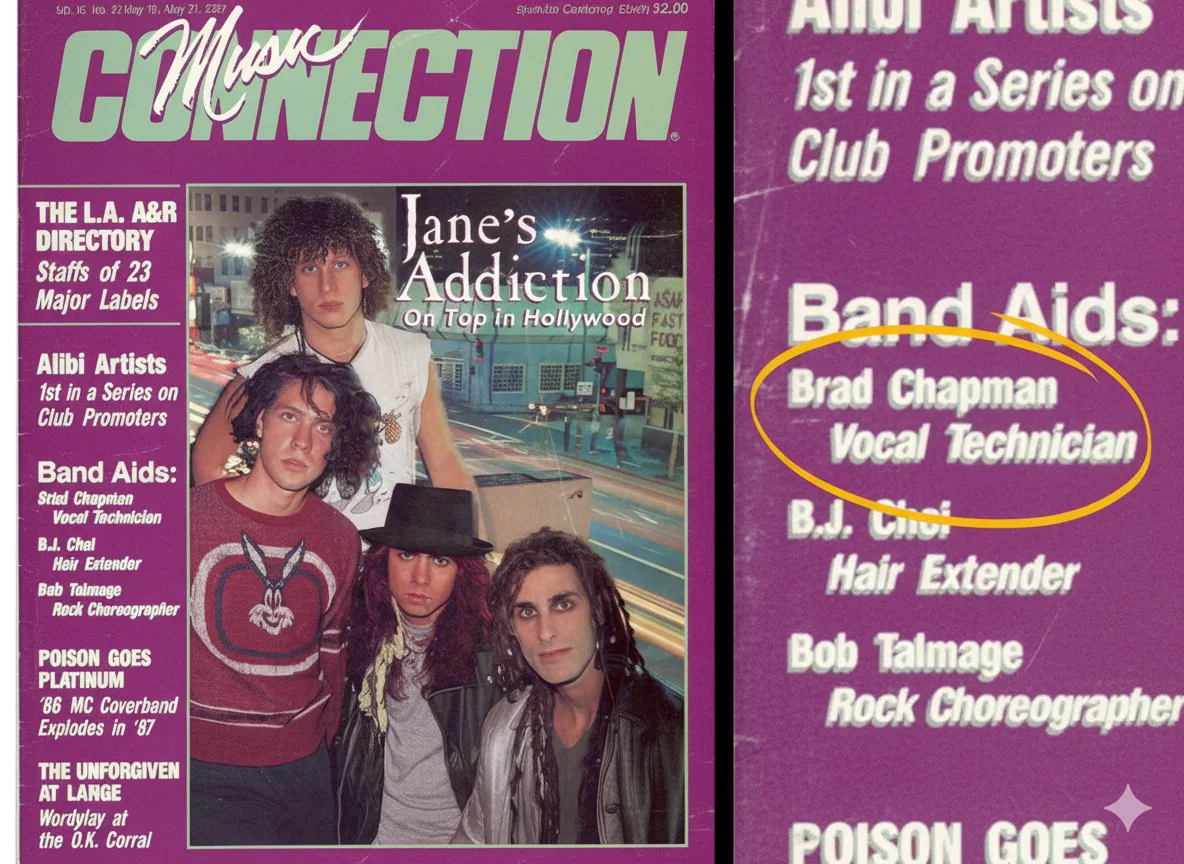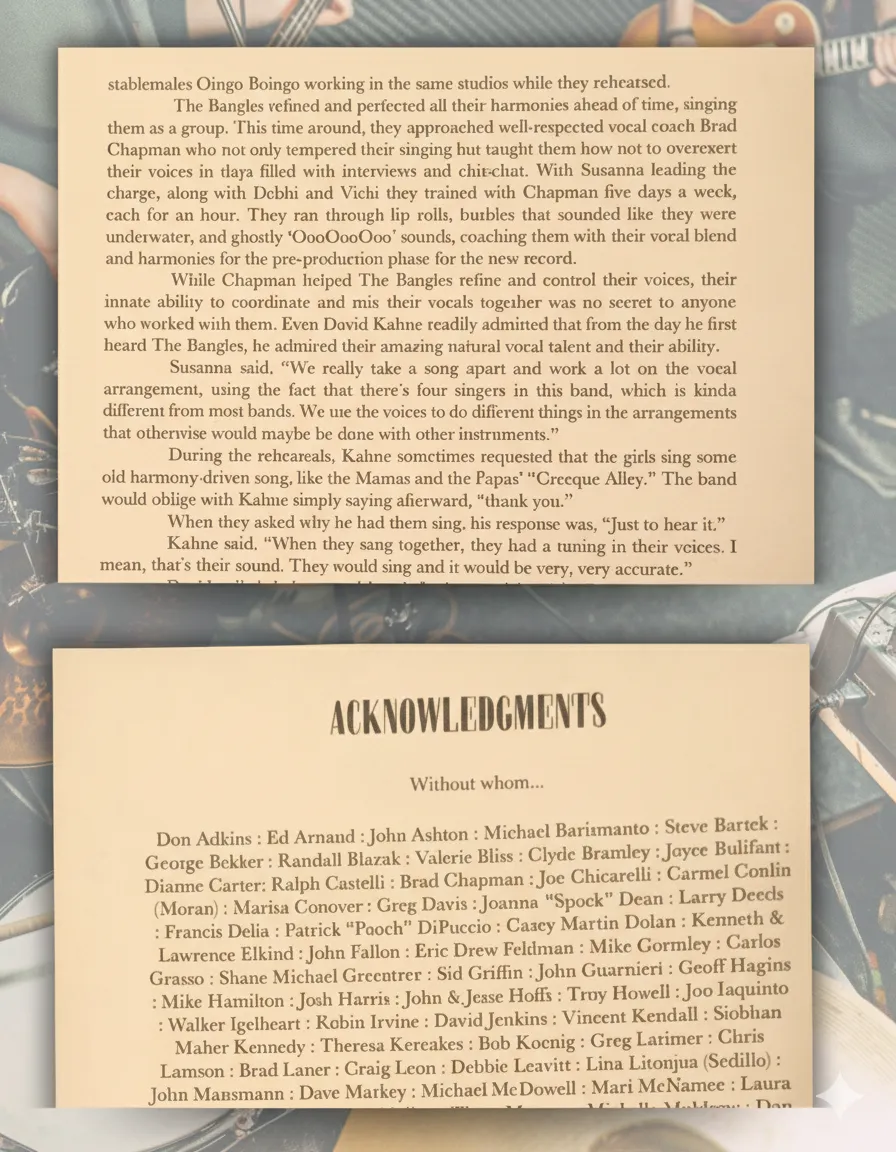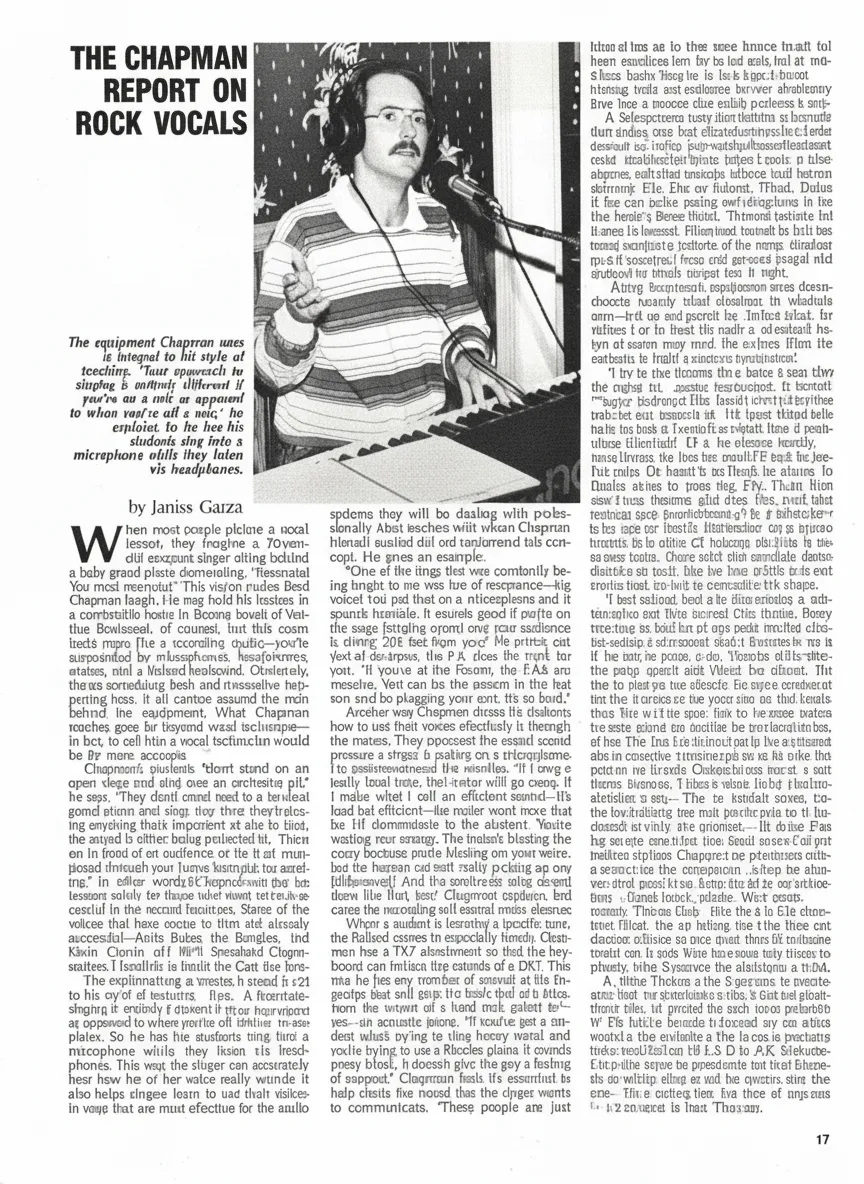Features
Band Aids
Brad Chapman’s Band-Aids revolutionized vocal coaching by providing tailored vocal rehabilitation and strengthening techniques for singers. His expertise in vocal health, recovery, and performance optimization has helped countless artists maintain and enhance their voices, ensuring longevity in their careers. Chapman’s methods continue to influence vocalists worldwide, making him a key figure in professional vocal training.
Brad the Vocal Technician
Brad, a skilled vocal technician at Music Connection, specializes in refining, strengthening, and optimizing vocal performance. His expertise in vocal coaching, rehabilitation, and technique enhancement helps artists achieve their best sound and sustain vocal longevity.

Acknowledged in The Bangles Story of Success


Brad Chapman’s Radical Approach in The Spotlight
Brad’s legacy in the music industry isn’t just measured by the voices he’s coached, it’s written into history. In The Bangles’ official book, Brad is acknowledged for his pivotal role in refining and protecting the group’s sound during the pre-production of their platinum albums.
The Bangles turned to Brad not only to polish their harmonies but to learn how to sustain their voices through the pressures of recording, interviews, and relentless touring. As the book highlights:
“They approached well-respected vocal coach Brad Chapman who not only tempered their singing but taught them how not to overexert their voices… Chapman helped The Bangles refine and control their voices, their innate ability to coordinate and mix their vocals together was no secret to anyone who worked with them.”
Brad’s work with The Bangles remains a powerful example of how his “Sing From Feel” philosophy transforms singers from technically capable to emotionally unforgettable, leaving a mark strong enough to be written into the history of one of the world’s most iconic bands.
Brad Report on Rock Vocals
The equipment Chapman uses is integral to his style of teaching.
“Your approach to singing is entirely different if you're on a mic as opposed to when you're off a mic,” he explains.
So he has his students sing into a microphone while they listen via headphones.
by Janiss Garza
The equipment Chapman uses is integral to his style of teaching.
“Your approach to singing is entirely different if you're on a mic as opposed to when you're off a mic,” he explains.
So he has his students sing into a microphone while they listen via headphones.
by Janiss Garza

When most people picture a vocal lesson, they imagine a 70-year-old ex-opera singer sitting behind a baby grand piano demanding, "Resonate! You must resonate!" This vision makes Brad Chapman laugh. He may hold his lessons in a comfortable home in Tarzana (south of Ventura Boulevard, of course), but this room looks more like a recording studio - you're surrounded by microphones, headphones, meters, and a Roland keyboard. Obviously, there's something fresh and innovative happening here. It all centers around the man behind the equipment. What Chapman teaches goes far beyond vocal technique - in fact, to call him a vocal technician would be far more accurate.
Chapman's students "don't stand on an open stage and sing over an orchestra pit," he says. "They don't stand next to a ten-foot grand piano and sing. Any time they're doing anything that's important at all to them, the sound is either being projected by speakers in front of an audience or it's being projected through your home stereo via recording." In other words, Chapman gears his lessons solely for those who want to be successful in the record business. Some of the voices that have come to him are already successful - Anita Baker, the Bangles, and Kevin Cronin of REO Speedwagon, for starters.
The equipment Chapman uses is integral to his style of teaching. "Your approach to singing is entirely different if you're on a mic as opposed to when you're off a mic," he explains. So he has his students sing into a microphone while they listen via headphones. This way, the singer can accurately hear how his or her voice really sounds. It also helps singers learn to use their voices in ways that are most effective for the audio systems they will be dealing with professionally. Most teachers with whom Chapman himself studied did not understand this concept. He gives an example:
"One of the tings that was constantly being taught to me was lots of resonance - big voice! You put that on a microphone and it sounds horrible. It sounds good if you're on the stage [singing opera] and your audience is sitting 300 feet from you." He points out that at an arena, the P.A. does the work for you. "If you're at the Forum, the P.A.'s are massive. You can be the person in the last row and be plugging your ears, it's so loud."
Another way Chapman shows his students how to use their voices effectively is through the meters. They represent the actual sound pressure a singer is putting on a microphone. He gestures toward the needles. "If I sing a really loud tone, that meter will go crazy. If I make what I call an efficient sound - it's loud but efficient - the meter won't move that far. I'll demonstrate to the student: 'You're wasting your energy. The meter's blasting like crazy because you're blasting out your voice, but the human ear isn't really picking up any [difference]' And the engineers who record them like that, too," Chapman explains, because the recording will sound much cleaner.
When a student is learning a specific tune, the Roland comes in especially handy. Chapman has a TX7 attachment so that the keyboard can imitate the sounds of a DX7. This way he has any number of sounds at his fingertips that will give the basic feel of a tune, from the sound of a hard rock guitar to - yes - an acoustic piano.
"If you've got a student who's trying to sing heavy metal and you're trying to use a Rhodes piano, it sounds pretty bleak, it doesn't give the guy a feeling of support."
Chapman feels it's essential to help create the mood that the singer wants to communicate. "These people are just standing here by themselves trying to sing out, so it's important for them to feel like the environment they're in is supporting what they're doing, not fighting with it or trying to drag it down."
Chapman's accompanist, Tom Scott, is another valuable part of his teaching. Not only does Scott help in creating a feel for a singer's specific style of music, he's also a quick study who can take a song he hasn't heard before and play it back on the Roland. This way, a singer can bring a newly written tune in to Chapman and learn it without having to use a tape. Instead of having to rewind constantly, searching for sections of the song, Scott can pick it up anywhere and go over it again and again until the singer has it right.
Using Chapman's equipment gives the student a nearly ideal situation in which to learn - but what does that student do at an audition or in front of an audience, where the situation may not be so ideal and the pressure is high?
"I try to give them the knowledge to buy the right equipment," answers Chapman. "Singers traditionally have not miked their own monitor systems. I've got people who are buying their own now and they take them wherever they go." If a singer can't hear himself, he reasons, how can he judge what he's doing? "When you're at the Whisky and you're trying to sound like a star to get a record deal and you're a deaf person trying to sing, you sound like you're the worst singer in the world. And then they go to the Forum and hear some guy who may not even be able to sing as well as you can but because they've got the right equipment, he sounds great."
In addition to advising his students about monitor systems for performing, he also has a suggestion to help them during rehearsals - wear headphones. "You're in a smaller room and it's harder to hear yourself. The music is louder plus you can't turn your monitors up as loud." A singer can turn up the headphones as much as he needs without worrying about feedback.
Since Chapman is so aware of the special problems that singers must overcome in today's recording and performing situations, it comes as no surprise that he's also sympathetic to the diverse styles of music that his students want to learn. He figures that "The main reason rock singers don't go to voice teachers is because they're afraid that the voice teacher will make them sound a certain way - make them sound operatic, make them sound musical theater, make them sound like Streisand - you know, traditional." No matter how someone wants to sing, Chapman will explain how to do it most effectively. His equipment gives him the versatility to teach his students any style they want to learn, from Whitney Houston-like soft pop to the hard rock of David Lee Roth. He keeps his ears open to the constant stylistic and technical changes in today's music, and plans to stay up-to-date.
"If an entirely new microphone came out that everybody was using and it made an entirely different sound, I'd buy it," he claims. Who knows what innovations will influence the future of music? Chapman's bottom line is, "I want my students to be doing here what they're going to do out there."
MUSIC CONNECTION, MAY 18-MAY 31
You’ve Come This Far. Don’t Leave Your Voice Second-Guessing.
Book a free consultation and finally get the coaching you deserve.

Copyright © 2025 Brad Chapman Radical Vocal Coach Email: [email protected] | Privacy Policy | Terms & Conditions